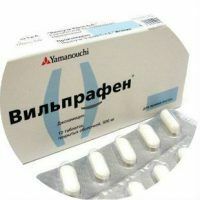
Wilprafen is an antibacterial agent of the macrolide group. Has a bacteriostatic effect due to inhibition of protein synthesis by bacteria. The drug is highly active against a large number of intracellular microorganisms and Gram-positive aerobic bacteria. The antibiotic has no analogues cheaper for the active substance, but with the permission of the doctor it can be substituted for drugs that are similar in indications and their pharmacological action.
- Wilprafen
- Analogues
- Doxycycline( Doxal, Doxycycline Hydrochloride, Doxycycline-Acos, Doxycycline-Ferein)
- Clarithromycin( Clacid, Klabaks OD, Clarexide, Claricin, Ecositrin, Formyl OOH, Fromilide)
- Metronidazole( Metronidazole Nycomed, Trichopol, Flaugel, Clion)
- Roxithromycin( Roxid, Rovelve, Brilid, Roximizan, Elroks, Rulid, Xitrocin, Roxibel)
- Spiramycin-Vero( Rovamycin, Spiramisar)
- Sumamed( Azithromycin, Azithromycin-OBL, Azilide, Zitrolide, Azitrox, Chemomycin)
- FlemoxiSaltab( Amoxicillin, Amoxicillin Sandoz, Amosin, Ecobol)
- Ceftriaxone( Rocefin, Azaran, Cefaxone, Ceftriaxone Kabi)
- Cyphran( Ciprolet, Ciprofloxacin, Cyprinol, Ciprobay)
- Erespal( Erispirus, Epistat, Codeostim, Eladon)
- Unidox Solutab)
In addition to Vilprrafen's antibiotic, there is a preparation of Wilprafen Solutab, according to the active substance, pharmacological action and indications they are absolutely identical, the difference is only in the form of release and dosage.
Wilprafen
The active substance of the preparation is josamycin, form of release: tablets, suspension, tablets, dispersible( dissolving in the oral cavity).
Indications for use are infectious-inflammatory diseases caused by drug-susceptible microorganisms:
- scarlet fever( in case of hypersensitivity to penicillins);
- infection of ENT organs and upper respiratory tract( including pharyngitis, tonsillitis, laryngitis, tonsillitis, paratonzillitis, sinusitis, maxillary sinusitis, otitis media);
- infection of the lower respiratory tract( chronic and acute bronchitis, community-acquired pneumonia);
- diphtheria( in addition to diphtheria antitoxin therapy);
- parasitic infections( psittacosis, toxoplasmosis, ureaplasma, streptococcus, staphylococcus, mycoplasma);
- whooping cough;
- infections in dentistry( including periodontitis, gingivitis, alveolitis, pericoronitis, alveolar abscess);
- infections of the skin and soft tissues( abscess, furuncle, folliculitis, furunculosis, acne, anthrax, acne, phlegmon, erysipelas, panaritium, lymphadenitis, lymphangitis);
- infection in ophthalmology( dacryocystitis, blepharitis);
- syphilis, gonorrhea( with intolerance to penicillin), venereal lymphogranuloma, chlamydia;
- infection in gynecology( adnexitis, endometritis, etc.);
- burns and wound infections;
- gastrointestinal diseases( gastric and duodenal ulcer, chronic gastritis);
- infections of the urinary tract and genital organs( cervicitis, urethritis, cystitis, prostatitis, pyelonephritis, epididymitis, caused by mycoplasmas and / or chlamydia).
The antibiotic, according to the instructions, is permitted during pregnancy and lactation strictly according to the intended use.
Side effects: rarely - nausea, lack of appetite, vomiting, heartburn, dysbiosis, diarrhea;in some cases - an increase in the activity of hepatic transaminases, jaundice and violation of bile flow, urticaria, hearing impairment, candidiasis.
Analogues of
to the table of contents ^Doxycycline( Doxal, Doxycycline Hydrochloride, Doxycycline-Acos, Doxycycline-Ferein)
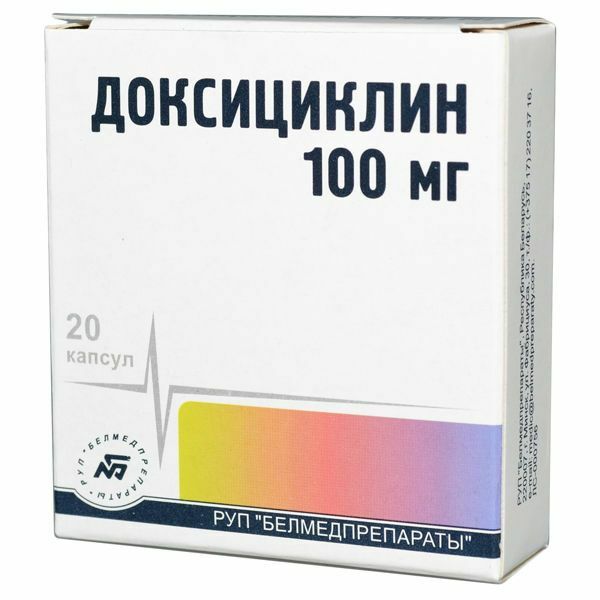
Produced in the form of capsules, lyophilizate;active ingredient is doxycycline hydrochloride.
A broad-spectrum tetracycline antibiotic is indicated in many infectious-inflammatory diseases.
Capsules for adults and children from 12 years old( weighing more than 45 kilograms) are prescribed in an average daily dose of 200 milligrams on the first day, then 100 milligrams per day. Depending on the severity of the disease, the maximum daily dose for adults is 300-600 milligrams for 5 days.
Side effects: dizziness, anorexia, impaired vision, constipation, nausea, rashes, dermatitis, urticaria, myalgia, impaired liver function.
Clarithromycin( Clacid, Klabaks OD, Clarexide, Claricin, Ecositrin, Formylid OOH, Fromilide)
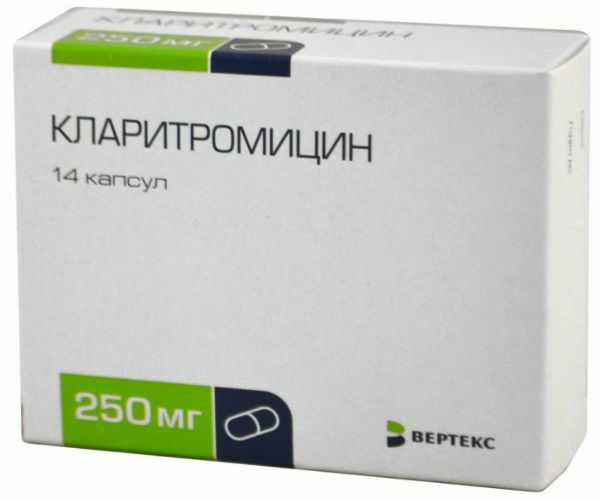
Produced in tablets, capsules;active ingredient is clarithromycin.
A broad-spectrum antibiotic used in the treatment of infectious and inflammatory diseases: upper and lower respiratory tract infections, ENT organs, skin and soft tissues, odontogenic and mycobacterial infections.
Adults and children over 12 years of age are prescribed a single dose of 0.25-1 grams, divided into 2 doses;Children under 12 years of age - 7.5-15 milligrams / kilogram / day in 2 divided doses. Maximum daily doses: for children - 1 gram, for adults - 2 grams.
Side effects: diarrhea, nausea, vomiting, abdominal pain, dyspepsia, gastritis, stomatitis, skin rash, urticaria, dermatitis, insomnia, headache, drowsiness, hypersensitivity, intense sweating, deafness, anorexia, asthma.
Metronidazole( Metronidazole Nycomed, Trichopolum, Flagil, Clione)
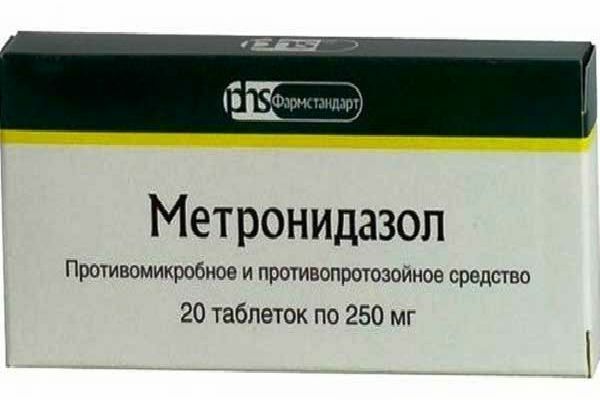
Produced in the form of tablets, suppositories, solution, gel;active substance - metronidazole.
The drug is used to treat infectious diseases of the intestinal( including amoebic liver abscess, dysentery) and the genital area( chlamydia, bacterial vaginosis) in adults, children, also during pregnancy and lactation.
The dosing regimen is prescribed by the doctor individually depending on the disease and severity of its course, as well as the age of the patient. Tablets should be taken orally during or after a meal, without chewing and washing with water or milk. The average duration of admission is 10 days. In case of severe course of the disease, the doses may be increased, and women are additionally assigned metronidazole in the form of suppositories( for example, with trichomoniasis).
Side effects: nausea, diarrhea, anorexia, constipation, dry mouth, dizziness, weakness, headache, depression, irritability, cystitis, candidiasis, urticaria, skin hyperemia, nasal congestion.
Roxithromycin( Roxid, Rovinal, Brilid, Roksimizan, Elroks, Rulid, Xitrocin, Roxibel)
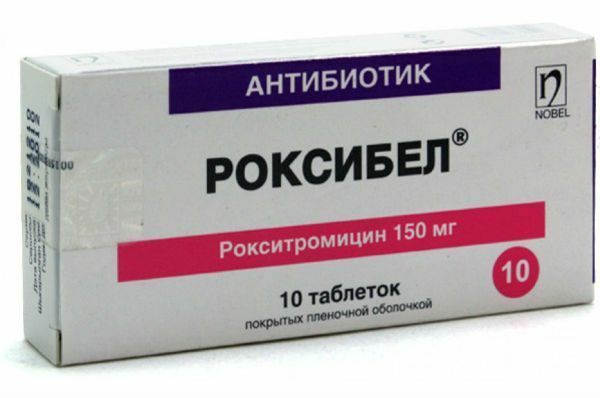
Produced in the form of tablets, capsules;active ingredient is roxithromycin.
Semisynthetic macrolide has a bacteriostatic effect. It is prescribed for infectious lesions of the upper and lower respiratory tract, bacterial infections of the ENT organs, urinary system. The medicine is also used for diphtheria, scarlet fever, whooping cough, erythematous rashes, periodonitis.
Tablets and capsules must be taken before meals, with water. Adults and children over 12 years of age( with a weight of more than 40 kilograms), the standard dosage is 150 milligrams twice a day or 300 milligrams once. If necessary, the doctor can adjust the dose.
Side effects: vomiting, nausea, diarrhea, pancreatitis, headache, rash, temporary hearing loss, odor disorders, bronchospasm, candidiasis.
Spiramycin-Vero( Rovamycin, Spiramisar)
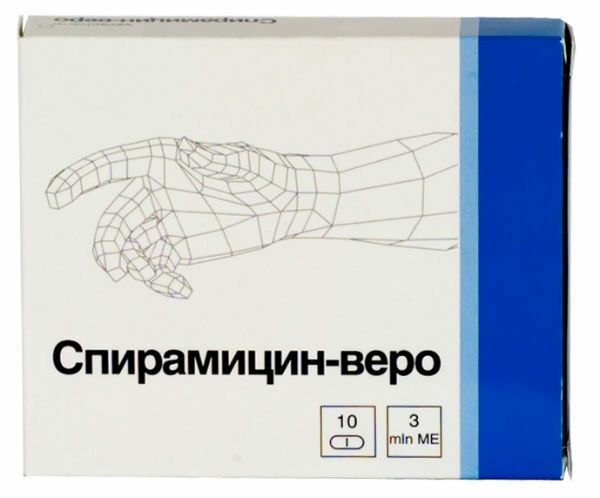
Produced in the form of tablets;the active substance is spiramycin.
Antibiotic has a bacteriostatic effect and is indicated for toxoplasmosis, acute bronchitis, exacerbation of chronic bronchitis, community-acquired pneumonia, sinusitis, rhinitis, tonsillitis, urethritis and other infectious-inflammatory diseases.
Adults and children from 18 years of age are prescribed 1 tablet twice a day for 5-7 days. The maximum daily dose is 3 tablets. The medicine should be taken before meals, with enough liquid.
Side effects: paresthesia, prolonged QT interval, acute hemolysis, thrombocytopenia, Quincke's edema, pruritus, rash, nausea, diarrhea, vomiting, cholestatic hepatitis.
Sumamed( Azithromycin, Azithromycin-OBL, Azilide, Zitrolide, Azitrox, Chemomycin)
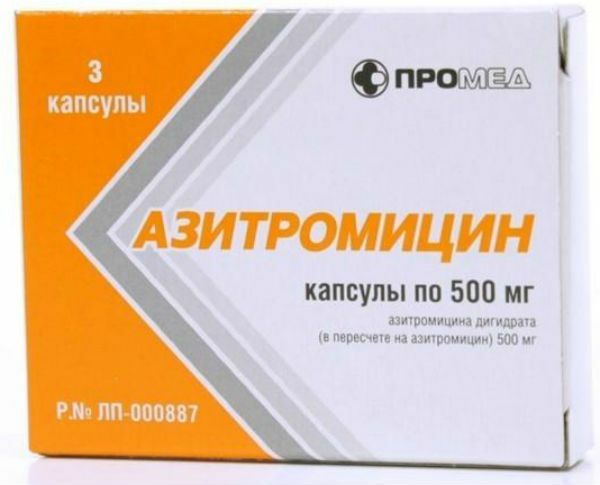
Produced in the form of capsules, powder, tablets, lyophilizate;active substance - azithromycin dihydrate.
Antibiotics of the macrolide group are prescribed for infectious and inflammatory diseases caused by susceptible microorganisms: upper and lower respiratory tract infections, skin and soft tissue, genitourinary tract, etc.
Capsules and tablets are taken orally for 1 hour before or 2 hoursafter eating without chewing. Adults and children from 12 years of age are prescribed 500 milligrams 1 time per 24 hours for 3-5 days, depending on the nature of the disease. Children from 3 to 12 years of age, the drug is prescribed at the rate of 10 milligram / kilogram of weight 1 time per day for 3 days. Babies from 6 months to 3 years are prescribed a suspension of 2.5-5 milliliters 1 time per day.
Side effects: candidiasis, leukopenia, anorexia, headache, drowsiness or insomnia, anxiety, irritability, impaired vision.
Flemoxin Solutab( Amoxicillin, Amoxicillin Sandoz, Amosin, EcoBall)
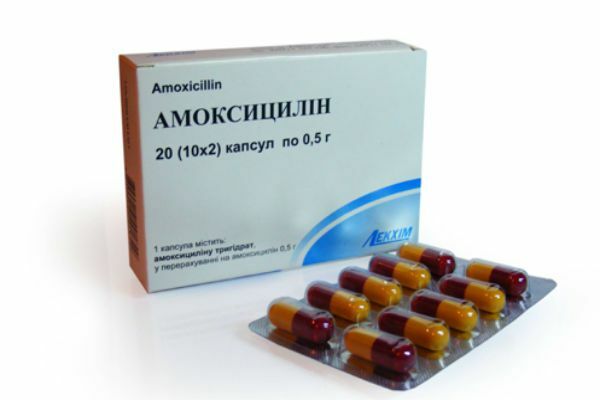
Produced in the form of dispersible tablets;active ingredient is amoxicillin.
Antibiotic of the penicillin group with a wide spectrum of antimicrobial activity. Indication: bacterial infections of the respiratory system( pneumonia, angina, sinusitis, pharyngitis, acute inflammation of the middle ear), urogenital system organs( pyelitis, urethritis, pyelonephritis, endometritis, cervicitis), skin and soft tissues( rye, impetigo, secondarily infected dermatoses),organs of the digestive system and abdominal infections( dysentery, cholecystitis, typhoid fever).
Tablets can be swallowed whole or pre-dissolved in water. The doctor prescribes the dosage individually depending on the course of the disease, the age of the patient and the sensitivity of the pathogen to the agent.
Side effects: rarely - vomiting, nausea, dysbacteriosis, stomatitis, crystalluria, leukopenia, eosinophilia, anxiety, insomnia, headache, convulsions, shortness of breath, skin rashes and others.
Ceftriaxone( Rocefin, Azaran, Cefaxone, Ceftriaxone Cabi)
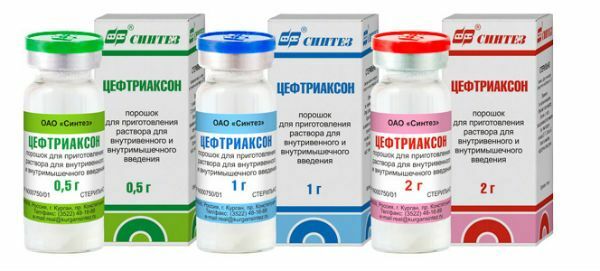
Is available in the form of a powder for the preparation of a solution for injection;the active substance is ceftriaxone.
The antibiotic group of cephalosporins, like Wilprafen, is indicated for the treatment of a variety of infections: meningitis, sepsis, skin and soft tissue, ENT organs, etc. The medication is administered intravenously or intramuscularly.
Adults and children from 12 years of age are prescribed 1-2 grams 1 time per day;newborn, depending on body weight.
Side effects: rash, bronchospasm, fever, nausea, diarrhea, vomiting, flatulence, stomatitis, leukopenia, impaired renal function, phlebitis, etc.
Cyphran( Cyprolet, Ciprofloxacin, Cyprinol, Ciprobai)
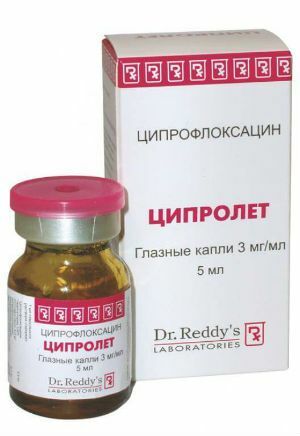
Is available in the form of tablets and solution;the active ingredient is ciprofloxacin hydrochloride.
Indications for the use of the antibiotic group of fluoroquinolones are infectious and inflammatory diseases, including pathology of the respiratory tract, pelvic organs and abdominal cavity, bones, skin, joints;infection of ENT organs, therapy of postoperative infections. For topical use: subacute and acute conjunctivitis, blepharitis, keratitis, meibomites and so on.
Doses are prescribed individually. The duration of treatment is from 7-10 days to 4 weeks. The course of treatment is 1-2 weeks.
Side effects: dizziness, sleep disorder, nausea, vomiting, abdominal pain, crystalluria, dysuria, tachycardia, neutropenia, Quincke's edema, hives and others.
Erespal( Erispirus, Epistat, Codeostim, Eladon)
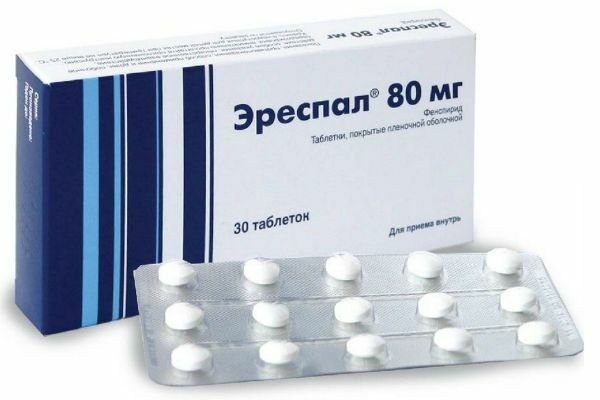
Produced in the form of tablets, syrup;active ingredient is fenspiride hydrochloride.
The drug with anti-bronchoconstrictive and anti-inflammatory activity is used in diseases of the lower and upper respiratory tract: laryngitis, rhinopharyngitis, tracheobronchitis, bronchial asthma, bronchitis, respiratory events( hoarseness, cough, throat swelling), whooping cough, measles, flu, sinusitis andOtitis of different origin.
Adults and children from 18 years of age Erespal appoint 1 tablet 2-3 times a day. The maximum daily dose is 240 milligrams. Children are advised to take the drug in the form of a syrup per kilogram of body weight.
Side effects: nausea, diarrhea, dysbacteriosis, mild tachycardia, drowsiness, abdominal pain, urticaria, rash, fatigue.
Unidox Solutab( Xedocin)
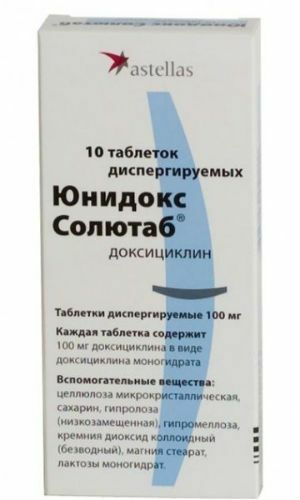
Produced in the form of tablets;active ingredient - doxycycline monohydrate.
Analog Wilprafen Solutab. Antibacterial preparation of the group of tetracyclines of wide spectrum of action is used for the treatment of infectious and inflammatory diseases: respiratory infections, ENT organs, sexually transmitted diseases, genitourinary system, gastrointestinal tract, etc.
Tablets are taken with food, previously dissolved in a small amount of liquid( 20 milliliters).The average duration of treatment is 5-10 days. Dosages are prescribed by the doctor based on the age and weight of the patient, the severity of the disease.
Side effects: anorexia, dysphagia, oesophageal ulcer, dermatitis, urticaria, anaphylactic reactions, pericarditis, neutropenia, vestibular disorders, candidiasis, etc.
Contraindications: pregnancy, breastfeeding, porphyria, severe renal and / or liver dysfunction, age to8 years, hypersensitivity.
